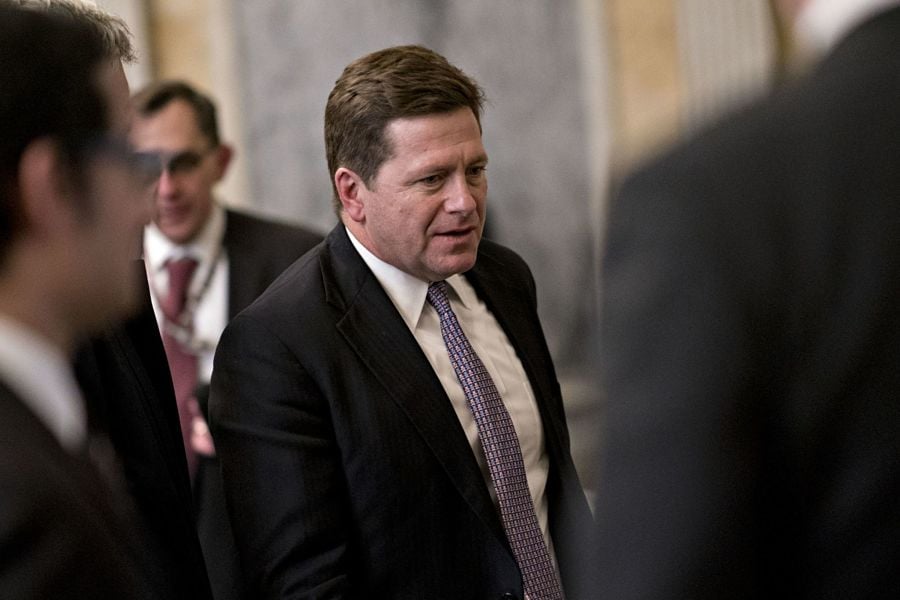

Jay Clayton, who has led the U.S. Securities and Exchange Commission for most of President Donald Trump’s term in office, said in a statement Monday that he will step down at the end of the year.
Clayton, a 54-year-old former deals lawyer who left New York-based Sullivan & Cromwell to join Wall Street’s main regulator, avoided the scandals that embroiled other Trump appointees and the political turmoil that engulfed previous SEC chairmen.
A political neophyte not registered with either political party, Clayton mostly succeeded in casting himself as being focused on protecting small-time investors from fraud and financial industry abuses rather than waging ideological fights.
Clayton’s claim to political independence was called into question when the White House said in June that it would tap him to replace a federal prosecutor who was investigating Trump’s associates. In the end, the bid to nominate him was blocked by Democrats, who said Clayton’s lack of criminal law experience made him unqualified for the job.
Democrat Joe Biden is expected to name his SEC chairman pick in the coming weeks.
Names the president-elect’s advisers are discussing as possible candidates include Gary Gensler, a Commodity Futures Trading Commission chairman during the Obama administration; Preet Bharara, Manhattan’s ex-top federal prosecutor; Kara Stein, a former Democratic SEC commissioner; Allison Lee, a current Democratic SEC commissioner; ex-SEC Commissioner Robert Jackson Jr., a political independent; and Chris Brummer, a Georgetown University law professor, according to people familiar with the matter.
With the support of the SEC’s Republican commissioners, Clayton was able to enact policy changes such as new broker conduct rules and a crackdown on firms that advise major shareholders on how to vote in corporate elections. He also pushed through a series of de-regulatory measures that make it easier to raise money in private markets.
At other times, Clayton bucked Republicans and sided with the agency’s Democrats to approve fines and other enforcement actions against firms accused of breaking securities laws. He also refused to significantly pare back the scope of the agency’s enforcement work as some conservatives and business groups wanted.
It’s standard practice for an SEC chairman to step down shortly after a presidential election, especially if there is a change of the party in power. Once the head of the agency leaves, one of the commissioners is installed as the acting leader until a permanent replacement is appointed by the president and confirmed by the Senate.
Clayton’s exit will be cheered by cryptocurrency enthusiasts who consider him a frustrating impediment. As the crypto bubble of 2017 and 2018 threatened to overshadow his agenda, Clayton led the SEC in taking a hard-line on digital assets. The agency said that they were covered by securities laws and sued to halt initial coin offerings and refused to approve Bitcoin exchange-traded fund.
Intercontinental Exchange Inc.’s New York Stock Exchange and Nasdaq Inc. may also be happy to see him leave. Clayton often clashed with the companies over how they charge for market data, which has become the lifeblood of modern trading. Through rule changes and in court, the SEC sought to limit the exchanges’ abilities to raise fees.

Relationships are key to our business but advisors are often slow to engage in specific activities designed to foster them.

Whichever path you go down, act now while you're still in control.

Pro-bitcoin professionals, however, say the cryptocurrency has ushered in change.

“LPL has evolved significantly over the last decade and still wants to scale up,” says one industry executive.

Survey findings from the Nationwide Retirement Institute offers pearls of planning wisdom from 60- to 65-year-olds, as well as insights into concerns.
Streamline your outreach with Aidentified's AI-driven solutions
This season’s market volatility: Positioning for rate relief, income growth and the AI rebound
